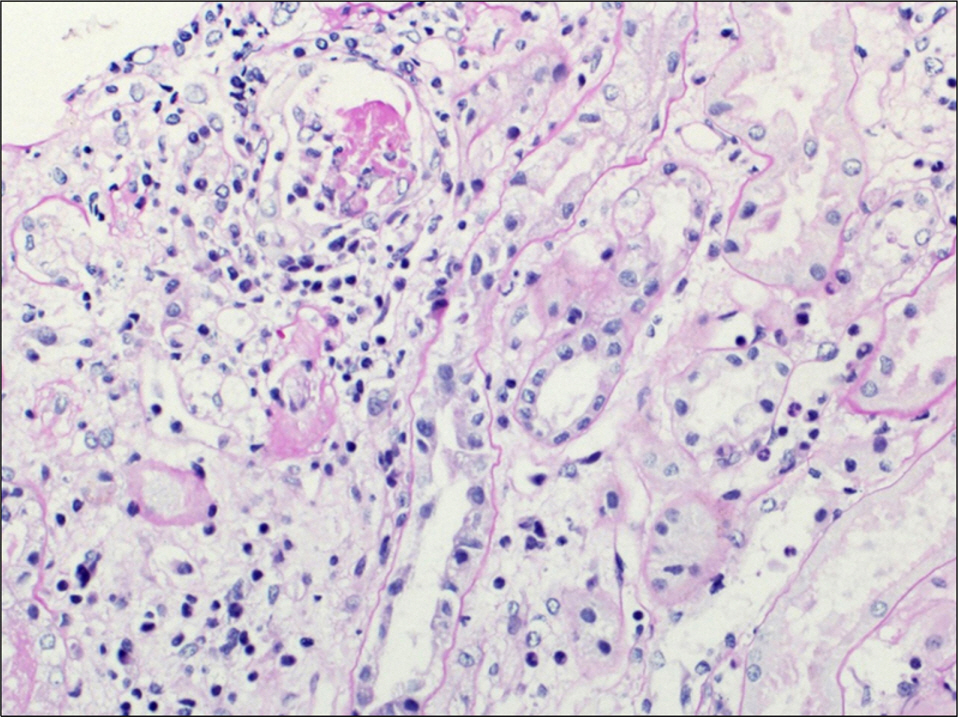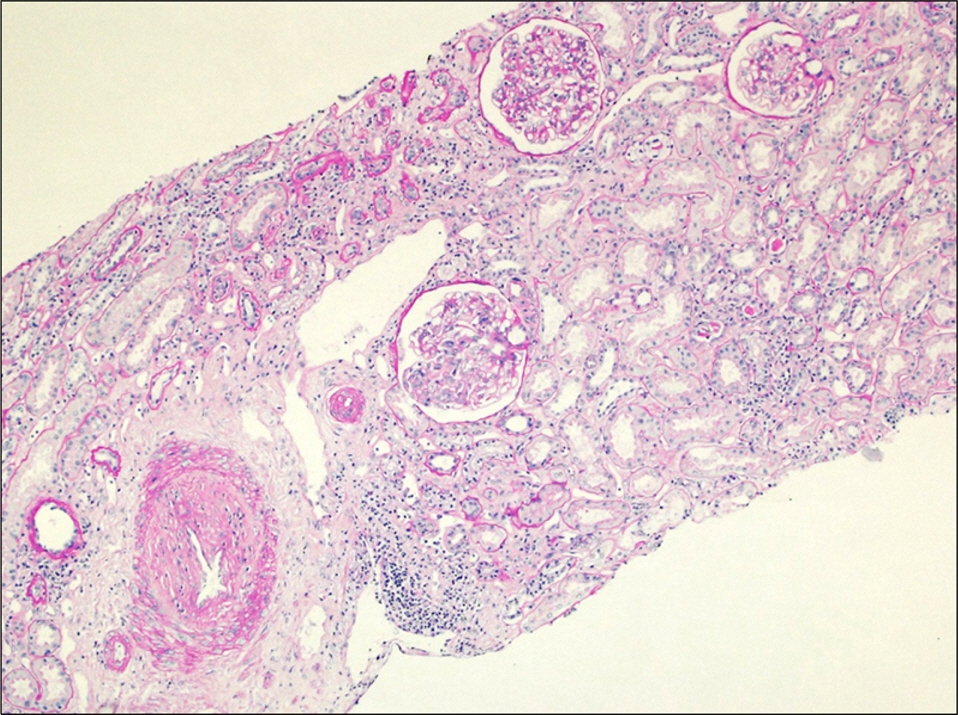J Korean Soc Transplant.
2014 Jun;28(2):87-90. 10.4285/jkstn.2014.28.2.87.
Treatment of Refractory Antibody-mediated Rejection with Bortezomib in a Kidney Transplant Recipient: A Case Report
- Affiliations
-
- 1Department of Internal Medicine, Soonchunhyang University Hospital, Soonchunhyang University College of Medicine, Seoul, Korea. jeonjs@schmc.ac.kr
- 2Department of Surgery, Soonchunhyang University Hospital, Soonchunhyang University College of Medicine, Seoul, Korea.
- 3Department of Pathology, Soonchunhyang University Hospital, Soonchunhyang University College of Medicine, Seoul, Korea.
- KMID: 2202536
- DOI: http://doi.org/10.4285/jkstn.2014.28.2.87
Abstract
- Antibody-mediated rejection (ABMR) is associated with poor renal allograft survival. It shows poor response to conventional treatment with plasmapheresis, rituximab, and intravenous immunoglobulin. Bortezomib, a proteasome inhibitor used for treatment of multiple myeloma, has recently been reported as a treatment alternative for recipient desensitization and ABMR. A 58-year-old man was diagnosed with mixed-type ABMR with donor specific antibodies and acute T cell-mediated rejection early after kidney transplantation. Conventional therapy was administered, including antithymocyte globulin, plasmapheresis, and rituximab; however, his condition was found to be refractory to these antihumoral therapies. Following administration of bortezomib, his serum creatinine level returned to baseline with stable graft function. His serum creatinine level remains stable at 1.3 mg/dL at 10 months posttransplantation. Bortezomib is effective for treatment of refractory ABMR following kidney transplantation.
MeSH Terms
Figure
Reference
-
References
1). Sureshkumar KK, Hussain SM, Marcus RJ, Ko TY, Khan AS, Tom K, et al. Proteasome inhibition with bortezomib: an effective therapy for severe antibody mediated rejection after renal transplantation. Clin Nephrol. 2012; 77:246–53.
Article2). Cicora F, Paz M, Mos F, Roberti J. Use of bortezomib to treat anti-HLA antibodies in renal transplant patients: a singlecenter experience. Transpl Immunol. 2013; 29:7–10.
Article3). Flechner SM, Fatica R, Askar M, Stephany BR, Poggio E, Koo A, et al. The role of proteasome inhibition with bortezomib in the treatment of antibody-mediated rejection after kidney-only or kidney-combined organ transplantation. Transplantation. 2010; 90:1486–92.
Article4). Park SJ, Yu H, Kang SH, Baek SD, Baek CH, Jeong JH, et al. Proteasome-inhibitor-based primary therapy for antibody-mediated rejection in a renal transplant recipient. Korean J Med. 2011; 81:780–5.5). Guthoff M, Schmid-Horch B, Weisel KC, Haring HU, Konigsrainer A, Heyne N. Proteasome inhibition by bortezomib: effect on HLA-antibody levels and specificity in sensitized patients awaiting renal allograft transplantation. Transpl Immunol. 2012; 26:171–5.
Article6). Everly MJ, Terasaki PI, Trivedi HL. Durability of antibody removal following proteasome inhibitor-based therapy. Transplantation. 2012; 93:572–7.
Article7). Walsh RC, Alloway RR, Girnita AL, Woodle ES. Proteasome inhibitor-based therapy for antibody-mediated rejection. Kidney Int. 2012; 81:1067–74.8). Haas M, Sis B, Racusen LC, Solez K, Glotz D, Colvin RB, et al. Banff 2013 meeting report: inclusion of c4d-negative antibody-mediated rejection and antibody-associated arterial lesions. Am J Transplant. 2014; 14:272–83.
Article9). Roberts DM, Jiang SH, Chadban SJ. The treatment of acute antibody-mediated rejection in kidney transplant recipients-a systematic review. Transplantation. 2012; 94:775–83.
Article10). Davis CL, Hricik DE. Transplant: immunology and treatment of rejection. Am J Kidney Dis. 2004; 43:1116–37.
Article11). Rajkumar SV, Richardson PG, Hideshima T, Anderson KC. Proteasome inhibition as a novel therapeutic target in human cancer. J Clin Oncol. 2005; 23:630–9.
Article12). Everly MJ, Everly JJ, Susskind B, Brailey P, Arend LJ, Alloway RR, et al. Bortezomib provides effective therapy for antibody- and cell-mediated acute rejection. Transplantation. 2008; 86:1754–61.
Article13). Perry DK, Burns JM, Pollinger HS, Amiot BP, Gloor JM, Gores GJ, et al. Proteasome inhibition causes apoptosis of normal human plasma cells preventing alloantibody production. Am J Transplant. 2009; 9:201–9.
Article14). Waiser J, Budde K, Schütz M, Liefeldt L, Rudolph B, Schönemann C, et al. Comparison between bortezomib and rituximab in the treatment of antibody-mediated renal allograft rejection. Nephrol Dial Transplant. 2012; 27:1246–51.
Article15). Sijpkens YW, Doxiadis II, Mallat MJ, de Fijter JW, Bruijn JA, Claas FH, et al. Early versus late acute rejection episodes in renal transplantation. Transplantation. 2003; 75:204–8.
Article16). Walsh RC, Brailey P, Girnita A, Alloway RR, Shields AR, Wall GE, et al. Early and late acute antibody-mediated rejection differ immunologically and in response to proteasome inhibition. Transplantation. 2011; 91:1218–26.
Article17). Woodle ES, Alloway RR, Girnita A. Proteasome inhibitor treatment of antibody-mediated allograft rejection. Curr Opin Organ Transplant. 2011; 16:434–8.
Article18). Schmidt N, Alloway RR, Walsh RC, Sadaka B, Shields AR, Girnita AL, et al. Prospective evaluation of the toxicity profile of proteasome inhibitor-based therapy in renal transplant candidates and recipients. Transplantation. 2012; 94:352–61.
Article
- Full Text Links
- Actions
-
Cited
- CITED
-
- Close
- Share
- Similar articles
-
- The Effect of Bortezomib on the Management of Immediate Postoperative Refractory Antibody-Mediated Rejection after Kidney Transplantation
- Acute T cell-mediated rejection after administration of the BNT162b2 mRNA COVID-19 vaccine in a kidney transplant recipient: a case report
- A case report of antibody-mediated rejection after re-pancreas transplant alone
- Proteasome-Inhibitor-Based Primary Therapy for Antibody-Mediated Rejection in a Renal Transplant Recipient
- Successful treatment of early acute antibody-mediated rejection in an human leukocyte antigen-incompatible and ABO-incompatible living-donor kidney transplant patient



